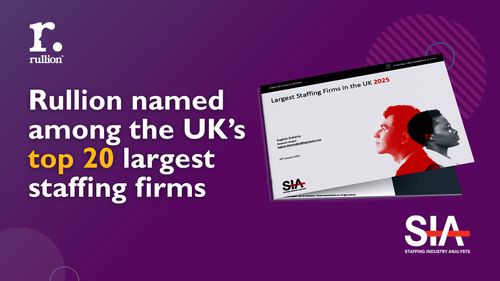Net Zero Recruitment: Why Energy Companies Need to Evolve Their Hiring Strategies
Net zero isn’t just a future goal anymore; it’s a driving force that’s transforming the energy industry. Energy companies are increasingly feeling the effects of this shift toward a more sustainable, carbon-free world. The transition to renewable energy from traditional sources is presenting unique challenges when it comes to energy recruitment. Companies are scrambling to reassemble their workforces so they are capable of pushing forward with net-zero initiatives.
As we enter the environmental revolution, let's take a closer look at the changes this will bring and how energy companies can create a net zero recruitment strategy.
What is net zero and why is it important?
Net zero means that the amount of greenhouse gases we put into the air is equal to the amount we take out or absorb. In other words, the goal is to make sure we don’t release more carbon dioxide or other harmful gases than nature or technology can remove. This balance is critical to limiting global warming to 1.5 degrees Celsius, a target set by countries around the world under the Paris Agreement.
Achieving net zero isn’t something that can happen overnight. It requires substantial changes across all areas of society, like how we travel, build our homes, grow food, and manage waste. Energy is one of the biggest sources of carbon emissions because of burning fossil fuels like coal, oil, and gas. To reach net zero, we need to switch to cleaner energy sources like hydrogen and solar.
In the UK, the government’s target is to cut emissions by 78% by 2035 and reach net zero by 2050. To meet these goals, the energy sector needs to urgently innovate and recruit the green talent needed to build a more sustainable future.
Renewable energy talent: A new job landscape
The move away from fossil fuels towards renewable sources requires a major shift in skills and technologies. This move isn't just about switching from one type of energy to another; it changes the fundamental way energy is made, stored, distributed, and used. Because of this, it is changing the way energy companies need to recruit.
Many traditional energy jobs that were once essential are becoming less relevant, with a knock-on effect of increased worker reskilling and redeployment. At the same time, the renewable energy sector is generating a new wave of opportunities that demand a different skillset altogether. For energy companies, an effective net zero recruitment strategy is the key to keeping up with these changes in a sustainable way.
Skills shortage in renewable energy
By 2030, the energy transition is expected to create 14 million jobs in the energy supply industry and an additional 16 million jobs in the clean energy sector, in areas like efficiency, automotive, and construction. This totals 30 million new jobs globally. On the other hand, there is an anticipated loss of 5 million jobs in the fossil fuel industry by 2030. Despite this, the new job opportunities more than compensate for the losses.
Innovations in renewable energy technologies, energy storage solutions, and smart grids are creating new types of roles, too. For instance, opportunities are blooming in areas such as wind turbine technology, solar panel installation, and battery storage.
However, a significant gap is appearing between the demand for these skills and their availability. Companies are struggling to fill roles because of a shortage of workers with the requisite skills and knowledge. This skills gap is one of the biggest challenges energy companies are facing in their transition towards net zero.
The challenge of energy sector reskilling
Many traditional energy workers possess skills that are transferable to a renewable energy workforce. These skills can be applied to areas such as solar, offshore wind, hydro, decarbonisation, carbon capture, utility and storage, low-carbon gas production, transportation, and the mining of critical materials like lithium, copper, and cobalt. To avoid high levels of unemployment, government policymakers need to make sure that targeted technical training and skill development are available. This can help aid fossil fuel workers' ability and confidence in their switch to working in the renewable energy sector.
Companies must also grapple with the question of what to do with energy workers whose roles are no longer needed. Reskilling and redeploying is possible, but it's a solution that needs substantial resources and careful planning. A successful net zero recruitment strategy means not only equipping workers with new skills but also providing clear pathways for job placement.
Ready your energy workforces with Train to Deploy
Train to Deploy equips your energy workforce with the practical skills and knowledge needed to excel in the net-zero transition.
Its impact on energy eecruitment strategies
The transition to net zero is reshaping how energy recruitment strategies look. Traditional hiring methods won’t cut it when it comes to finding the right talent to lead this change. To get the next generation of workers interested, companies need to redefine what it means to work in the energy field. It’s no longer about fossil fuels; it's about driving technological growth and environmental progress. This shift is pushing energy companies to adopt net zero recruitment strategies. To succeed in their search for leading energy talent, they must:
- Partner with educational institutions to create a curriculum that teaches clean energy skills
- Implement robust training and development programmes to help current energy talent reskill
- Align their brand identity with sustainability and innovation to secure the next generation of workers
- Utilise social media and targeted employer branding to connect with candidates who are passionate about sustainability
The HR role in net zero recruitment
HR professionals play a pivotal role in helping their organisations reach net-zero goals. If your HR department also operates as your recruitment arm, they'll need to actively seek out talent that fits your sustainability objectives. This means developing clear career paths which support both tangible growth for the employee and the company's net-zero initiatives. Giving energy workers the chance to build new skills in green technology and procedures is just as necessary.
Beyond training, HR should work towards building a company culture that truly values sustainability and encourages new ideas. Your teams are more likely to be motivated when they know that their work has a direct impact on creating a greener future.
Why people matter as much as technology in energy recruitment
As vital as green technology is to the sustainable energy sector, we can't forget that human capital is equally essential. The success of net zero initiatives relies on the expertise, creativity, and dedication of your energy workforce. Companies need to invest in their workers by providing the necessary tools and resources to drive green innovations.
By highlighting the importance of their combined potential, companies can secure leading energy talent who are motivated to contribute to the global sustainability movement.
Creating a net zero recruitment strategy for a sustainable future
While the transition towards net zero generates a host of challenges, it also presents a unique chance to become a leader in the energy space. By harnessing these opportunities and implementing a net zero recruitment strategy, energy companies can build a forward-looking energy workforce, whilst positioning themselves as global drivers towards a sustainable future.
Are you ready to lead the charge towards a net-zero future? With the right talent, you can prosper. Learn more about our renewable energy recruitment solution or fill out our contact form below, and we can help you attract and retain the skilled energy workforce you need to shape a sustainable tomorrow.





